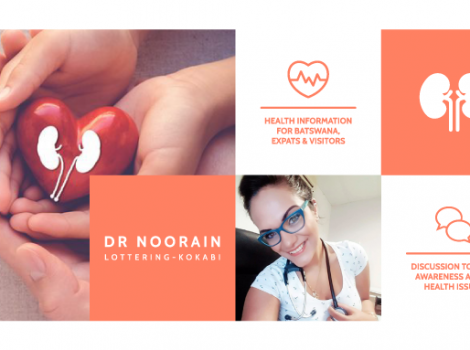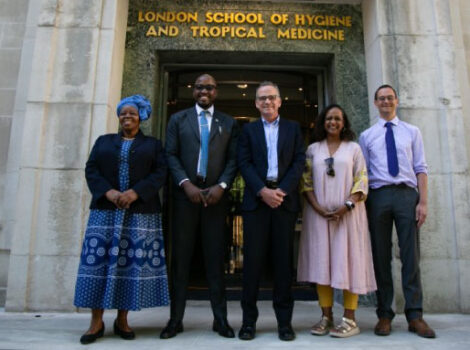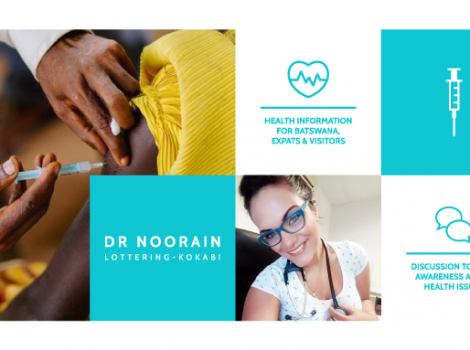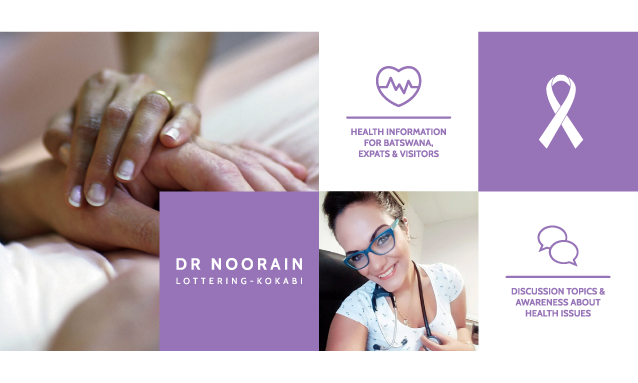
Fresh from commemorating World Cancer Day on February 4, Dr Noorain writes to empower us all to show support, raise our collective voice and take personal action to raise awareness about Cancer in Botswana.
The Big C. So many of us have been affected by this dreaded disease; whether you have a loved one battling against it or you know someone who has lost their battle against it. Worse still, you may have had your own personal battle with cancer. Without a doubt, cancer has found a way to affect us all.
In many cases, people have a subconscious paranoia or fear that they may develop or are actually living with the disease. With that said, in light of World Cancer Day, uniting people the world over in raising awareness about cancer, this article aims to equip the people of Botswana with the basics of cancer.
World Cancer Day is an international day marked on February 4 to raise awareness of cancer and to encourage its prevention, detection, and treatment. World Cancer Day was founded by the Union for International Cancer Control to support the goals of the World Cancer Declaration, written in 2008.
The theme for 2019 is “I am and I will” – all about your story and your commitment.
What exactly is cancer?
Firstly, we need to understand exactly what cancer is. While there are over 200 types of cancers, the term “cancer” refers to normal body cells that have begun to grow abnormally in both number and structure, leading to the creation of a “tumour”.
Blood cancers such as leukaemia are a little more specific, as they occur due to the abnormal number of white blood cells developing within the blood. As there are over 200 types of cancers, I can’t go into depth about each one but we can look at the most common cancers in Botswana, prevention and risk factors and most important of all, SCREENING.
According to the World Health Organisation (WHO) official country profile on Botswana released in 2014, these were the most common cancers found in Botswana:
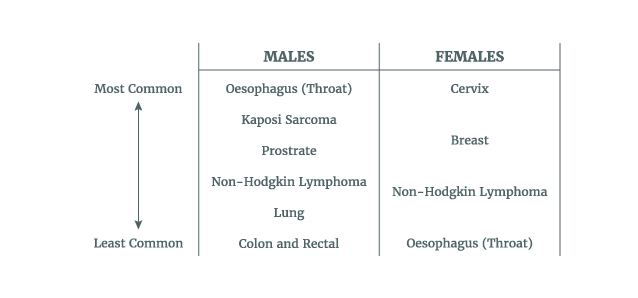
Causes and prevention
When we assess the causes of any disease, we need to look at the risk factors in 2 main categories:
- Modifiable – these are causes or risk factors that we as individuals can control
- Non-Modifiable – causes or risk factors that are beyond our control
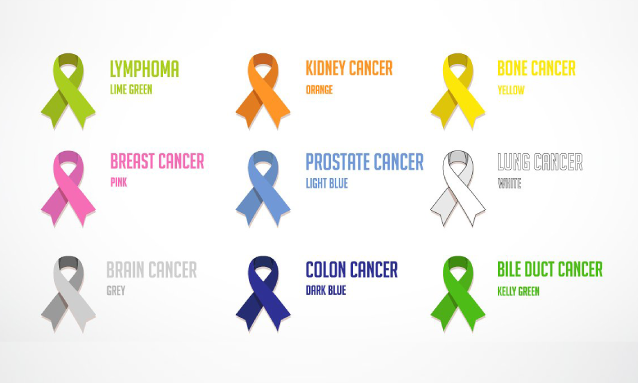
So what risk factors can you and your loved ones control to avoid cancers that are most common to Botswana developing?
- Alcohol – Medical evidence has repeatedly shown that all types of alcohol in varying amounts increase the risk of developing cancer. Basically, the more alcohol consumed the higher the risk of cancer. Oesophagus cancer is, in fact, one of the top cancers caused by alcohol intake. Conversely, the less you drink, the less the chance of developing oesophagus cancer.
- Smoking – Cigarettes contain tobacco, which contains more than 80 different cancer-causing chemicals. The chemicals not only affect the mouth and lungs but many other parts of the body because they enter your bloodstream. Just like alcohol risk, the more you smoke the higher your risk of developing cancer.
- Obesity and Exercise – People who are excessively overweight due to poor diet (for instance, regularly eating take-outs, greasy foods etc) have a higher risk of developing cancer. Also, you might consider cutting back on red meat to about once a week, as eating too much puts you at a higher risk of cancer. A 30-minute workout that increases your heart rate three times a week can effectively help you maintain a healthier weight and in turn, reduce cancer-developing risks.
- Infection and Vaccines – As the table above demonstrates, cervix and non-Hodgkin lymphomas are quite common in Botswana. Evidence has shown that 70% of cervix cancer cases are linked to the Human Papilloma Virus (HPV), while Non-Hodgkin is associated to Hepatitis B and C. Getting the vaccines from your healthcare provider can prevent all of these viruses.
Unfortunately, however, while you can do your best to control the risks, there are some factors that are well beyond our control.
- Age – As you get older, the more at risk you become as damage to cells in our bodies due to environmental factors and/or your genes can lead to cancer.
- Genetics – Sadly, some people are born with genes that predispose them to develop cancer.
- Immune System – Due to the prevalence of HIV in Botswana, it is important to highlight that those living with HIV are more likely to develop cancer (Kaposi Sarcoma) due to their weakened immunity.
What else you can do
It is important to always remain vigilant to allow for early detection and screening. Do not wait for symptoms to develop. While screening techniques vary for the different cancers, there are facilities available in Botswana to screen cancers common to Botswana.
While it’s naturally daunting, you must not “fear” receiving a cancer diagnosis but rather seek to find it early enough to have it treated. This means going for regular medical check-ups and asking your doctor for advice on early detection and screening methods such PAP smear for cervix cancer, mammograms for breast cancer etc. Remember, it is your right to ask questions to learn more about diseases and their prevention.
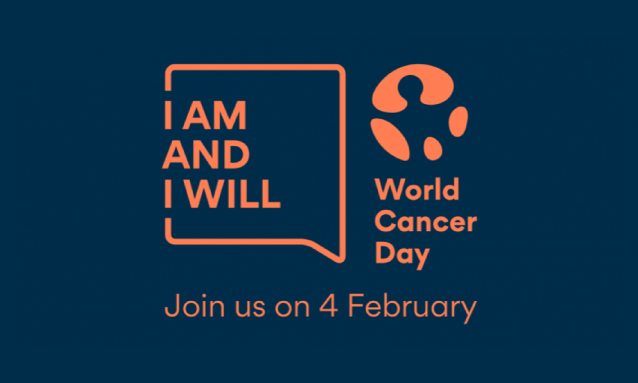
With that said, this year the Union of International Cancer Control launched a new 3-year campaign with the theme “I am and I will”. The theme aims to urge people the world over to make a personal commitment and use their individual power of action to impact their future and assist in the eradication of cancer.
So Botswana, please remember “I am and I will”.
Video courtesy of worldcancerday.org
By YourBotswana writer:
Dr. Noorain Lottering-Kokabi, BMSc, MBBS (UWI MONA)
Born in May 1989, Dr Noorain hails from Gaborone Botswana. She completed her Pre-Med at the University of Botswana and went on to attain her BMSc and MBBS degrees at The University of The West Indies in Kingston Jamaica.
Having practised medicine in both the Caribbean and Botswana, she has been exposed to an array of conditions and ailments that have in turn widened her scope of expertise. She is also involved in multiple philanthropic projects that aim to equip youths with relevant life skills and tools they need throughout their lives.
A young, diligent, enthusiastic professional with a formidable hunger to continuously seek further knowledge, both in alternative and modern medicine, Dr. Noorain aims to better the healthcare in the communities she serves.
She currently works in community health providing first line care for the community as a whole. Her current position has enabled her to manage both common and complex cases. These cases range from the common cold/flu, bites to mental health, uncontrolled diabetes, hypertension, tuberculosis and HIV (along with the associated complications). Having worked in the Caribbean, Dr. Noorain is very familiar with the treatment of tropical diseases and severe symptoms that may arise from such diseases.
Dr. Noorain provides quality outpatient care ensuring that her patients are fully educated on their respective illness. After all a patient that is well educated on their illness is more likely to comply with medical protocols and prevention strategies, hence reducing potential mortality and morbidity statistics, which reflects a healthy and happier Botswana.
Dr Noorain is a young, career driven, passionate, culturally and medically diverse professional. She is excited about her collaboration with YourBotswana, hoping to use the platform to educate citizens and visitors alike on current health issues in Botswana.

